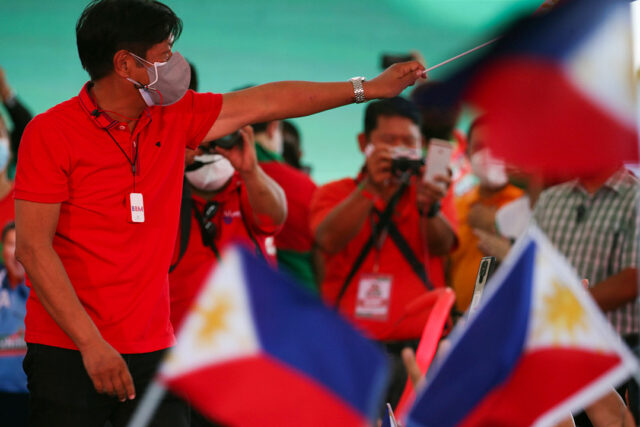
By Kyle Aristophere T. Atienza, Reporter
THE INCOMING ADMINISTRATION of Ferdinand R. Marcos, Jr. is expected to focus on infrastructure development to drive the Philippine economy’s recovery from the pandemic, but questions remain on how these projects will be funded.
Mr. Marcos, the only son and namesake of the late dictator, is poised to become the country’s 17th president after a landslide win in Monday’s election.
“(Mr. Marcos) did, however, pledge to continue with President Duterte’s economic policies, particularly the ‘Build, Build, Build’ infrastructure program that was the flagship project of the Duterte administration and helped boost the Philippines’ economic growth prior to the pandemic,” MUFG Bank analyst Sophia Ng said in a note.
In a commentary, Fitch Solutions said Mr. Marcos’s victory bodes well for policy continuity in the country, as his economic and foreign policy stances are similar to those implemented by Mr. Duterte.
“Marcos is likely to continue to focus on infrastructure development on the economic front, while striving to maintain a delicate balancing act between the US and China in terms of foreign policy,” Fitch Solutions said.
Infrastructure spending hit P895.1 billion in 2021, growing by a nearly a third from a year earlier.
Under the P5-trillion 2022 budget, about a fifth is allocated for capital outlays which includes infrastructure projects.
Terry L. Ridon, convenor of infrastructure think tank InfraWatchPH, said Mr. Marcos has not identified potential funding sources for his infrastructure plan. He said it is also not clear if Mr. Marcos would continue the Duterte administration’s shift from public-private partnership (PPP) to official development assistance (ODA) funding for major infrastructure projects.
“This is a policy which he must decide on in the coming days, and we hope he will decide considering mainly our debt position at the moment and the least cost to the public or end users of PPPs,” Mr. Ridon said in a Messenger chat.
“He should really put more meat on his pronouncement regarding the continuity of the ‘Build, Build, Build’ program because he has never provided specific details during the entire campaign,” he said.
Mr. Ridon urged the incoming Marcos administration to consider a shift to PPP projects to avoid incurring more debt.
As of end-March, the National Government’s (NG) total outstanding debt stood at a record P12.68 trillion.
BALANCING ACT
“(Mr.) Marcos faces a tricky balancing act between supporting the economic recovery and containing the Philippines’ burgeoning fiscal deficit,” Oxford Economics Lead Economist Sian Fenner and Assistant Economist Makoto Tsuchiya said in a note.
The Philippines’ budget deficit has sharply widened during the pandemic, as revenue collections remained lackluster.
The government has set a 2022 budget deficit ceiling of P1.65 trillion, equivalent to 7.7% of gross domestic product (GDP).
The country’s outstanding debt stood at P11.73 trillion as of end-2021. This pushed the debt-to-GDP ratio to a 16-year high of 60.5%, slightly beyond the 60% threshold considered as manageable by multilateral lenders for developing economies.
“It’s also possible that Macros Jr. announces a more expansionary fiscal agenda than we currently forecast… While the additional fiscal spending would support the recovery, it would undoubtedly catch the attention of the major rating agencies,” Oxford Economics said.
“We believe Marcos Jr. will need to balance the risks of a deteriorating external financing position against providing ongoing support for the recovery.”
Zyza Nadine Suzara, an economist and public finance expert, said Mr. Marcos will likely continue major infrastructure projects and implement “populist” measures such as subsidies for rice that may not be fiscally sustainable for the government.
“That way, we can actually expect a higher deficit, which means a higher level of debt to finance those kinds of programs,” she said in a phone interview.
She said the Marcoses need to settle their unpaid estate tax, which has ballooned to more than P200 billion due to interests and other penalties, to show their willingness to fix the country’s public finances.
UNCERTAINTY
Pantheon Macroeconomics, a think tank based in the United Kingdom, said that while uncertainty over the election is all but over, “ambiguity over Mr. Marcos’s economic policy positions is still there” as his campaign was devoid of specific proposals.
The public will only get an idea of the policies under a Marcos presidency by next month at the earliest, when the next administration will start to take shape, it said.
“We maintain, though, that this will be too late to salvage this year’s economic growth prospects, assuming we’re proven right about the temporary — but harsh — brakes likely applied in the current quarter to government spending and investment,” it added.
The late dictator’s son, who had a wide lead in pre-election surveys, declined major presidential debates, which experts said were necessary to determine the stances of candidates on key economic issues.
“Marcos has made it a point to not give any detail regarding his platform during the campaign, which is likely to drive economic uncertainty since he’s now leading the race,” said Leonardo A. Lanzona, who teaches economics at the Ateneo de Manila University.
Mr. Lanzona cited Mr. Marcos’s promise to lower rice prices by P20 to P30, which was done without consulting various sectors and considering economic aspects that might swell National Government debt.
“This is not the way elections are supposed to be conducted. It should offer the voters information about the public goods that the administration is supposed to produce and how much this will cost,” he said.
Agustin L. Arcenas, an economist at Ateneo, said some investors may reconsider plans to invest due to lack of clarity regarding an economic recovery plan.
“Investors have choices when it comes to where they will place their money, and they are likely to choose the country that has a positive business outlook,” he said in an e-mail. “In Southeast Asia, the Philippines must compete against countries like Vietnam and Thailand for investment.” — with Luz Wendy T. Noble
For all the latest Business News Click Here
For the latest news and updates, follow us on Google News.
